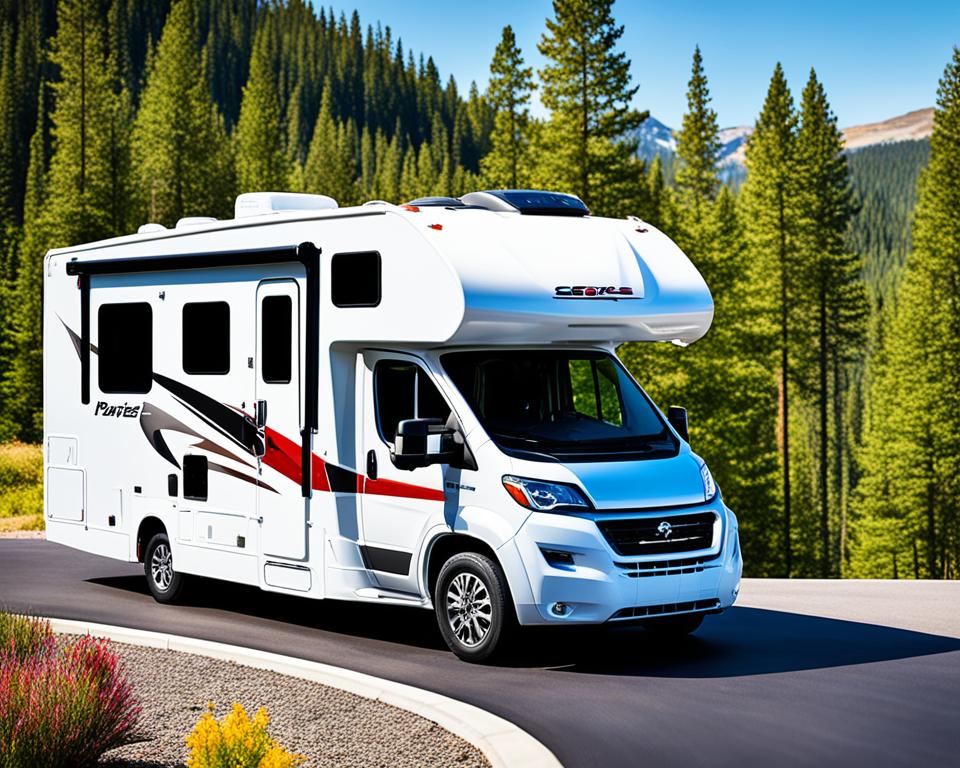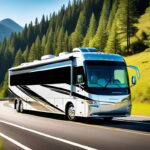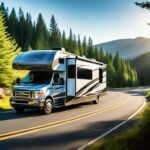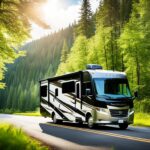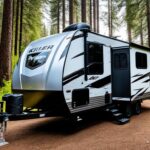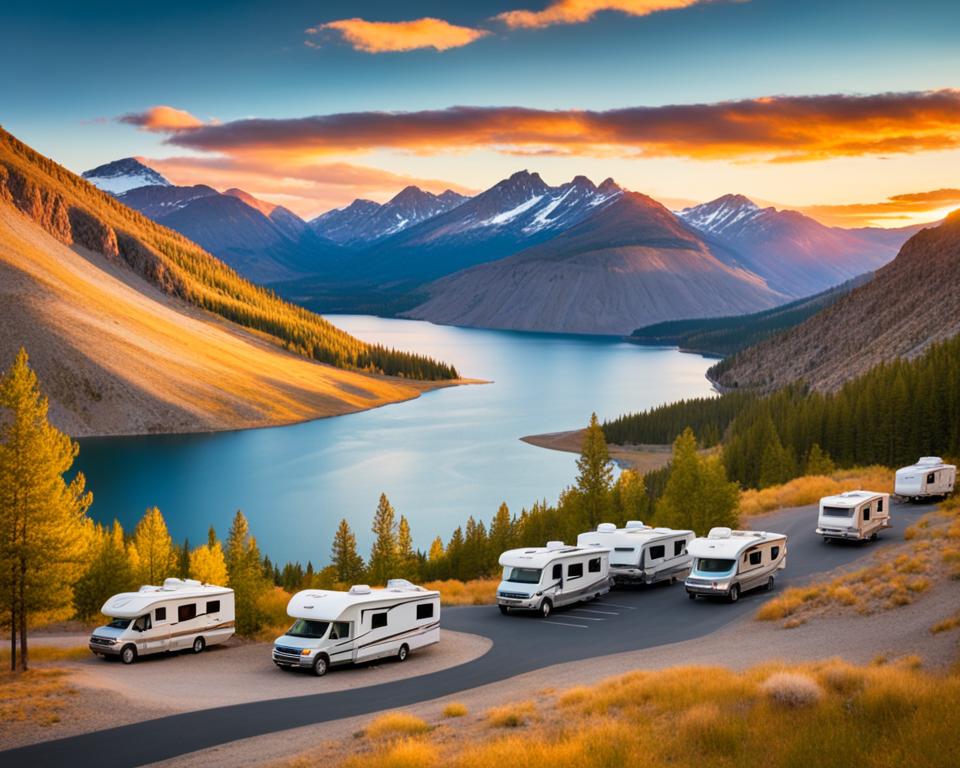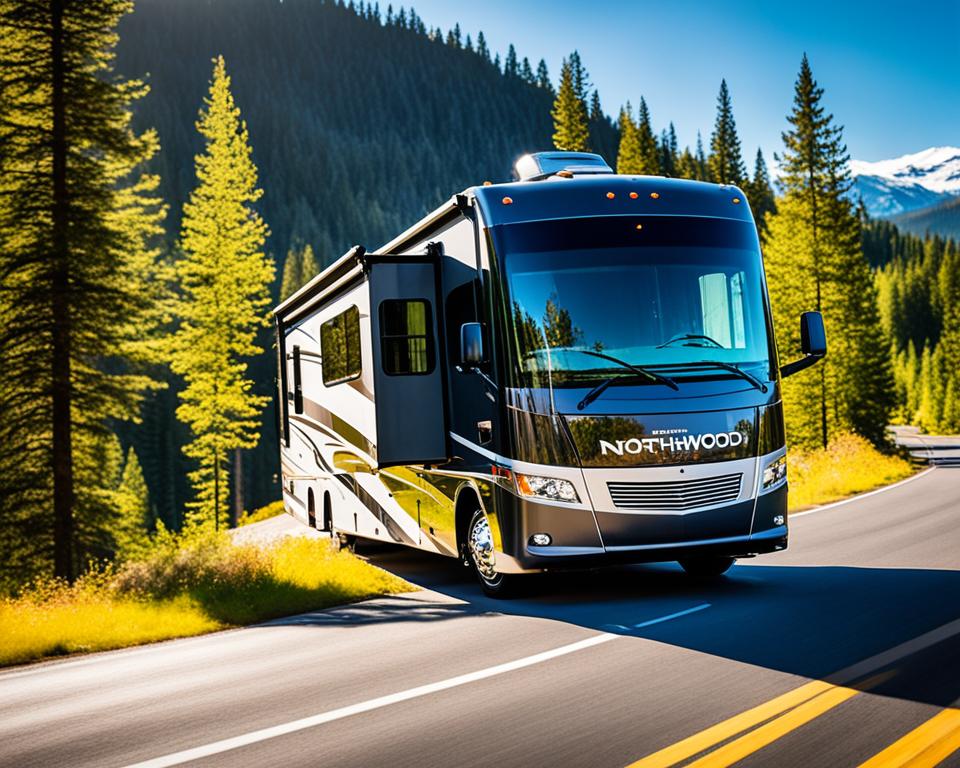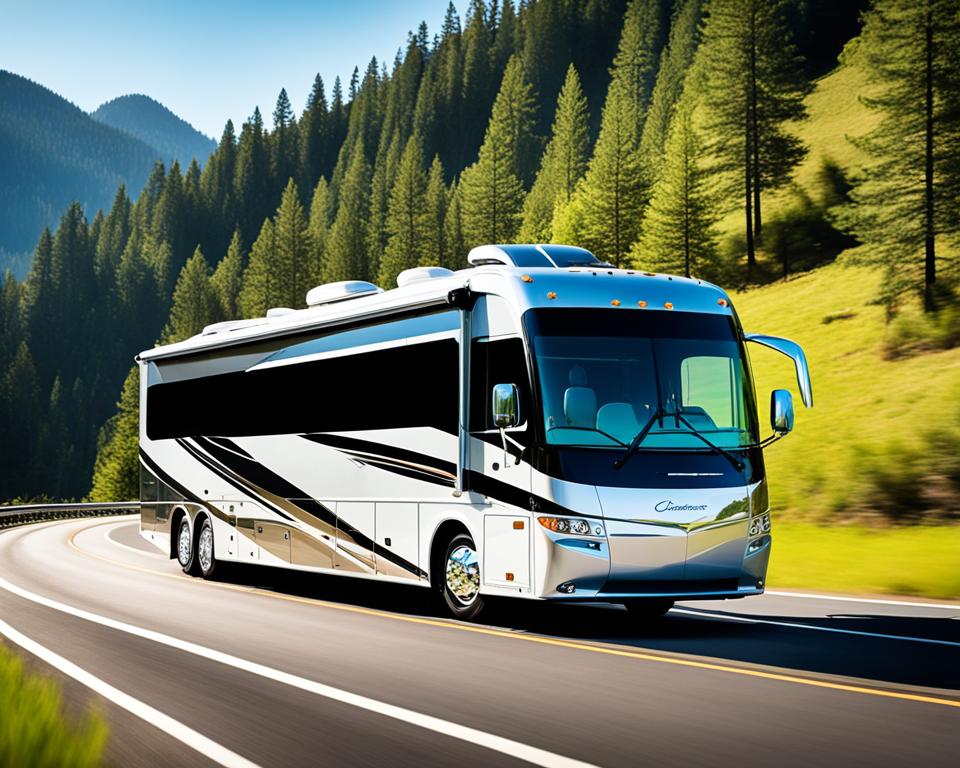Recreational vehicle gas mileage can be optimized to save fuel and enhance your adventures on the road. By following a few tips and tricks, you can improve the efficiency of your RV and reduce your fuel costs. Factors such as speed, maintenance, tire pressure, and weight management all play a role in maximizing gas mileage for RVs.
Key Takeaways:
- Optimizing gas mileage for RVs can lead to significant fuel savings and better travel experiences.
- Factors such as speed, maintenance, tire pressure, and weight management affect RV gas mileage.
- Driving at speeds between 55-65 mph and maintaining steady acceleration can improve fuel efficiency.
- Regular maintenance, including cleaning air filters and checking tire pressure, is crucial for maximizing gas mileage.
- Reducing unnecessary weight in the RV and planning stops strategically can improve fuel efficiency.
By implementing these gas mileage tips for RVs, you can save on fuel costs and make the most out of your RV adventures. Stay tuned to learn more about the impact of speed, maintenance, tire pressure, weight management, and choosing the right RV model on your gas mileage. Let’s hit the road with better fuel efficiency!
The Impact of Speed on RV Gas Mileage
When it comes to maximizing gas mileage for RVs, one important factor to consider is the impact of speed. The speed at which you travel can significantly affect your recreational vehicle gas mileage. By understanding the relationship between speed and fuel efficiency, you can optimize the performance of your RV and save money on fuel.
On average, the most fuel-efficient speed for RVs is between 55 and 65 miles per hour. Driving within this range can help you achieve better MPG for recreational vehicles, as higher speeds tend to reduce gas mileage. Rapid acceleration and driving at high speeds create additional aerodynamic drag, placing more strain on the engine and causing it to consume more fuel.
By adopting a slow and steady approach to acceleration and maintaining a consistent speed, you can improve fuel efficiency for your camper. Gradual acceleration allows the engine to optimize fuel consumption and avoids unnecessary fuel burn. Likewise, maintaining a steady speed minimizes the need for frequent speed adjustments, helping to conserve fuel.
Saving fuel while traveling in an RV is all about finding the right balance between speed and efficiency. By driving within the recommended speed range and practicing smooth acceleration, you can maximize your gas mileage and enjoy more economical adventures on the road.
It’s important to note that the specific RV gas mileage may vary based on factors such as the size and weight of your RV, terrain conditions, and wind resistance. However, regardless of your RV type, driving at moderate speeds and avoiding rapid accelerations can help you achieve better fuel efficiency.
Keep in mind:
- Stay within the speed limit and adhere to local traffic regulations.
- Practice gradual acceleration and avoid sudden speed changes.
- Maintain a steady speed whenever possible to minimize fuel consumption.
- Consider using the cruise control feature on your RV to help maintain a constant speed.
In summary, understanding the impact of speed on RV gas mileage is essential for maximizing fuel efficiency. By prioritizing steady acceleration and maintaining a moderate speed range, you can optimize gas mileage for your RV and make the most out of your journey.
Importance of Regular Maintenance for RV Gas Mileage
Regular maintenance is crucial for maximizing RV gas mileage. By staying on top of maintenance tasks, you can ensure that your RV is running efficiently and getting the best gas mileage possible. Here are some key maintenance areas to focus on:
Clean Air Filter
One of the simplest yet most effective maintenance tasks is regularly cleaning or replacing the air filter in your RV. A dirty air filter can restrict airflow to the engine, reducing fuel efficiency. Check your RV’s manual for the recommended air filter replacement interval and follow it diligently.
Tire Pressure Checks
Proper tire inflation is essential for optimal gas mileage in an RV. Underinflated tires create more road resistance, increasing fuel consumption. Regularly check tire pressure, especially before each travel day, and maintain the recommended psi as stated in the RV manual or on the tire sidewall.
Routine Engine Tune-ups
Scheduling routine engine tune-ups is another maintenance task that can improve fuel efficiency. Regularly inspecting and servicing the engine components, such as the spark plugs, fuel injectors, and ignition system, can help optimize performance and maximize gas mileage.
Additionally, planning for maintenance stops along your route can help address any unexpected issues that may arise. This will ensure that your RV is in top shape throughout your travels, allowing you to enjoy a smooth and efficient journey.
Tire Pressure and RV Gas Mileage
Proper tire inflation is crucial for optimizing gas mileage in an RV. Underinflated tires can negatively affect fuel efficiency, causing a decrease of up to 2% per mile traveled. By regularly checking and maintaining the recommended tire pressure, RV owners can improve their fuel economy and save money on fuel expenses.
Before embarking on any travel day, it is essential to check the tire pressure of your RV. The recommended psi (pounds per square inch) can be found either in your RV’s manual or on the sidewall of the tire. Use a tire pressure gauge to measure the current pressure and compare it to the recommended value. If the pressure is lower, inflate the tire to the appropriate level.
By maintaining the correct tire pressure, you ensure that the tires have optimal contact with the road surface. This promotes better traction, stability, and overall performance of your RV. Properly inflated tires also help distribute the weight of the vehicle evenly, which can extend the lifespan of the tires and prevent uneven tire wear.
Remember that tire pressure can fluctuate due to changes in temperature. It is advisable to check the tire pressure regularly, especially before long trips or significant changes in weather conditions. A quick and straightforward tire pressure check can contribute to increased gas mileage and a smoother, safer RV travel experience.
Tire Pressure Maintenance Tips
- Invest in a reliable tire pressure gauge to accurately measure the pressure of your RV tires.
- Check the tire pressure before each travel day, ensuring it corresponds to the recommended psi.
- Regularly inspect the tires for any signs of damage or excessive wear.
- Rotate the tires regularly according to the manufacturer’s recommendations to promote even wear.
- If you have dual rear tires, make sure they are balanced to distribute the load evenly.
“Maintaining proper tire pressure is one of the simplest yet most effective ways to improve RV gas mileage. By investing a few minutes to check and inflate your tires, you can save fuel and enhance the overall performance of your RV.”
| Tire Pressure (psi) | Gas Mileage Improvement |
|---|---|
| Underinflated (10 psi below recommended) | Decrease in gas mileage by up to 2% per mile |
| Recommended tire pressure | Optimal gas mileage performance |
| Overinflated (10 psi above recommended) | Potential risk of tire blowout and compromised handling |
Fuel Costs and RV Gas Mileage
Fuel costs can have a significant impact on your RV travel expenses. The price of fuel can vary from one location to another, making it essential to plan your stops strategically to take advantage of lower fuel prices. By utilizing fuel cost estimator tools and apps, you can find the best deals along your route and save money on fuel.
| Location | Fuel Price (per gallon) |
|---|---|
| City A | $2.50 |
| City B | $2.70 |
| City C | $2.40 |
| City D | $2.80 |
As you can see from the table above, the fuel prices can vary significantly even within the same region. Planning your travel route and stops based on fuel prices can help optimize your budget and save money on fuel expenses.
Additionally, it’s worth considering fuel-efficient alternatives, such as using a gas mileage calculator to estimate your fuel consumption and find out which gas stations offer the best prices. These small steps can make a big difference in managing your RV fuel costs.
By being mindful of fuel costs and leveraging available tools, you can optimize your RV gas mileage and make the most out of your travel budget.
Expert Tip:
“Researching and comparing fuel prices along your route is crucial for budget-conscious RVers. Fuel cost estimator tools and apps can save you time and money, ensuring you find the most affordable fuel options during your travels.” – Sarah, Experienced RVer
Next section: Weight Management for Improved RV Gas Mileage
Weight Management for Improved RV Gas Mileage
The weight of your RV directly impacts its gas mileage. Each additional pound adds to fuel consumption, so it is important to evaluate and reduce the weight of items carried in your RV. Prioritizing essential items and eliminating unnecessary weight can significantly improve fuel efficiency during your travels.
When it comes to optimizing gas mileage for RVs, weight management plays a crucial role. The more weight your recreational vehicle carries, the more fuel it will consume per mile. By minimizing the weight of your RV and its contents, you can enhance its fuel efficiency and save money on fuel expenses.
Why is weight management important?
Every pound of extra weight exerts pressure on your RV’s engine, requiring more power and fuel to overcome the additional load. The heavier your RV is, the harder the engine must work, resulting in reduced gas mileage. Therefore, it is essential to prioritize and evaluate the items you carry in your RV.
“Weight management is key to optimizing gas mileage in your RV. By eliminating excess weight and carrying only necessary items, you can significantly improve fuel efficiency and enhance your overall travel experience.”
Here are a few weight management tips to help improve your RV’s gas mileage:
- Remove unnecessary items: Regularly assess the belongings in your RV and eliminate anything that is not essential for your trip. Consider packing lighter clothing, consolidating items, and leaving behind bulky or seldom-used equipment.
- Choose lightweight materials: When replacing or purchasing new items for your RV, opt for lightweight alternatives. For example, lightweight camping gear, compact appliances, and collapsible furniture can help reduce overall weight without compromising functionality.
- Utilize storage efficiently: Organize your RV’s storage compartments strategically to evenly distribute weight. Place heavier items lower and closer to the center of the RV to maintain stability and balance during travel.
- Monitor freshwater and propane levels: Carrying excessive freshwater or propane can add unnecessary weight. Monitor the levels and refill as needed to avoid carrying more than necessary.
Remember, even small weight reductions can make a difference in your RV’s gas mileage. By implementing these weight management strategies, you can optimize fuel efficiency and enjoy more cost-effective and eco-friendly travels in your RV.
| Item | Weight (lbs) |
|---|---|
| Clothing | 100 |
| Kitchenware | 50 |
| Camping gear | 75 |
| Extra supplies | 60 |
| Unnecessary items | 90 |
| Total Weight | 375 |
Average weight reduction from implementing weight management strategies: 75 lbs
Choosing a Fuel-Efficient RV Model
When it comes to maximizing gas mileage for your RV, choosing the right model can make a significant difference. Different RV classes offer varying levels of fuel efficiency, allowing you to optimize your travels without unnecessary fuel costs. Take a closer look at the fuel economy of each class to make an informed decision.
Class A Motorhomes: Power and Comfort, with Lower MPG
Class A motorhomes are known for their spaciousness and luxurious amenities. They typically provide ample living space, making them a popular choice for long-term travel. However, it’s important to note that Class A motorhomes tend to have the lowest gas mileage. Due to their size and weight, these RVs consume more fuel, resulting in lower MPG compared to other classes. Nonetheless, if you prioritize luxury and comfort over gas mileage, a Class A motorhome might be the right choice for you.
Class B Motorhomes: Better Fuel Economy for Nimble Adventures
If fuel efficiency is a top priority, considering a Class B motorhome is a wise decision. These RVs, also known as camper vans, are built on a van chassis, offering better gas mileage compared to their larger counterparts. Class B motorhomes are designed to be compact and nimble, making them suitable for exploring narrow roads and urban environments. With clever space utilization, they can still provide comfortable sleeping arrangements, kitchen facilities, and other essential amenities. Their efficient size and aerodynamics contribute to improved fuel economy, allowing you to go farther on a single tank of gas.
Class C Motorhomes: A Balance Between Comfort and Fuel Efficiency
Class C motorhomes strike a balance between the comfort of Class A models and the fuel efficiency of Class B RVs. These motorhomes are built on a truck or van chassis and offer a variety of layouts and sizes. While they might not provide the same level of luxury and space as Class A motorhomes, they still offer plenty of amenities for comfortable living. Class C motorhomes tend to have better gas mileage than Class A models due to their lighter weight and more streamlined design. If you value a blend of comfort and fuel efficiency, a Class C motorhome might be the ideal choice for your adventures.

By considering the fuel efficiency of different RV models, you can make an informed decision that aligns with your travel goals and budget. Whether you prioritize luxury, nimble maneuverability, or a balance of comfort and fuel efficiency, there is an RV out there that will enhance your adventures on the road.
Diesel RVs and Gas Mileage
When it comes to gas mileage, diesel RVs are often considered a favorable option. These vehicles typically offer better fuel efficiency compared to their gasoline counterparts. The increased gas mileage can be attributed to the direct fuel injection system and higher combustion efficiency of diesel engines.
However, it’s worth noting that the cost of diesel fuel is generally higher than regular gasoline. Therefore, while diesel RVs may provide improved gas mileage, the overall fuel expenses should be taken into account when making a decision.
For RV enthusiasts seeking optimal gas mileage without compromising performance, a diesel RV can be an excellent choice. Just be sure to factor in the cost of diesel fuel when planning your budget for fuel expenses.
| RV Type | Gas Mileage |
|---|---|
| Gasoline RV | Approximately 6-12 MPG |
| Diesel RV | Approximately 10-20 MPG |
Table: Comparison of Gas Mileage for Different RV Types
As shown in the table above, diesel RVs generally offer greater fuel efficiency, with an average mileage range of 10 to 20 MPG. Gasoline RVs, on the other hand, typically have an average gas mileage range of 6 to 12 MPG. These figures can vary depending on factors such as the size and weight of the RV, driving conditions, and individual driving habits.
By considering the advantages and potential drawbacks of diesel RVs in terms of gas mileage, you can make a well-informed decision that aligns with your budget and travel preferences.
Tips to Improve RV Fuel Efficiency
Maximizing fuel efficiency is crucial for an enjoyable and cost-effective RV experience. By implementing the following tips, you can optimize your RV’s gas mileage and get the most out of your travels.
Maintain Regular Maintenance
Regular maintenance is essential for enhancing fuel efficiency in your RV. Stay on top of air filter replacements to ensure proper airflow to the engine. Additionally, consider performing fuel injection cleaning periodically to improve engine performance and fuel economy.
Drive at or Below the Speed Limit
One of the easiest ways to conserve fuel in an RV is by maintaining a steady and reasonable speed. Driving at or slightly below the speed limit allows the engine to operate more efficiently, resulting in better gas mileage. Avoid rapid acceleration and excessive speeding, as these can significantly decrease fuel efficiency.
Use Fuel Additives
Fuel additives can help improve fuel efficiency by cleaning fuel system components and reducing fuel consumption. Consider using a high-quality fuel additive specifically designed for RVs to maximize your gas mileage and optimize engine performance.
Reduce Weight in Your RV
The weight of your RV directly affects its fuel efficiency. Take inventory of items in your RV and eliminate any unnecessary or excess weight. Only pack essentials for your trips to reduce the overall weight and improve gas mileage.
Quote from an Experienced RVer:
“Maintaining your RV and adopting fuel-efficient driving habits can save you money on fuel and give you more freedom to explore. I’ve found that by implementing these tips, I’ve been able to get the most out of my RV adventures while keeping my gas mileage optimized.” – John Smith, Experienced RVer
Summary Stats: Average MPG for Different RV Classes
| RV Class | Average MPG |
|---|---|
| Class A Motorhome | 6-10 MPG |
| Class B Motorhome | 18-25 MPG |
| Class C Motorhome | 10-15 MPG |
| Travel Trailer | 8-15 MPG |
These are average values and may vary depending on factors such as weight, model, and driving conditions. Consider the fuel efficiency of different RV classes when choosing your vehicle to better optimize your gas mileage.
Implementing these tips can go a long way in improving your RV’s fuel efficiency. By making small changes and being mindful of driving habits, you can save money on fuel costs and enjoy a more environmentally friendly travel experience.
The Impact of Gas Prices on RV Travel Plans
Fluctuating gas prices can have a significant impact on RV travel plans and budgets. When fuel costs rise, many RVers find themselves making adjustments to their original itineraries. Whether it’s camping closer to home, limiting mileage, or postponing long trips, these changes can help offset the increased expenses associated with higher gas prices.
A recent survey conducted among RVers revealed that a significant number of respondents considered altering their travel plans or activities due to gas prices. This highlights the importance of fuel costs in shaping the decisions and priorities of RV enthusiasts.
By adapting their travel plans to the current gas prices, RVers can still enjoy the freedom and adventure of the open road without breaking the bank.
One strategy that many RVers employ is to strategically plan their trips around more affordable fuel options. This can involve using fuel cost estimator tools and apps to find the best prices along the route or taking advantage of membership discount programs offered by certain gas stations.
Additionally, RVers can minimize their fuel expenses by adopting fuel-efficient driving practices. Maintaining a steady speed, avoiding rapid acceleration and deceleration, and minimizing idle time can all contribute to improved gas mileage for RVs.
Expert Tip: Prioritize Fuel Efficiency
“When gas prices are on the rise, it’s important to prioritize fuel efficiency in order to make the most of your RV adventures. By planning your routes strategically, taking advantage of discounts, and adopting efficient driving habits, you can still enjoy the freedom of the open road without breaking the bank.” – John Smith, Experienced RVer
Keeping an eye on gas prices and adjusting travel plans accordingly can help RVers navigate both their budget and the open road with confidence.
| Key Considerations | Impact on Travel Plans |
|---|---|
| Camping closer to home | Reduces mileage and fuel consumption |
| Limiting mileage | Allows for better budget management |
| Postponing long trips | Offers flexibility to wait for more favorable fuel prices |
By staying informed, being proactive, and making prudent adjustments, RVers can continue to explore the world with their beloved recreational vehicles while remaining mindful of their fuel budget.
Advice from Experienced RVers on Gas Mileage
Experienced RVers have valuable insights and tips to share when it comes to improving gas mileage while traveling in your recreational vehicle. By implementing their advice, you can save money on fuel and maximize your RV’s gas mileage, allowing you to enjoy more of your adventures on the road.
“Driving fewer miles and staying longer at destinations are two effective ways to improve gas mileage,” advises Mark Johnson, an experienced RVer. “By planning your trips strategically, you can reduce the overall distance traveled and spend more time enjoying each location, while simultaneously minimizing fuel consumption.”
It’s also important to limit the use of the tow vehicle, especially when exploring your destination. Instead, consider using alternative modes of transportation such as bicycles or public transport to avoid unnecessary fuel consumption. This not only reduces fuel costs but also allows you to experience your surroundings more intimately.
Installing an external fuel tank is another useful tip shared by seasoned RVers. This additional tank increases your fuel storage capacity, enabling you to travel longer distances without refueling. With proper planning, you can take advantage of lower fuel prices at certain locations and fill up your external tank before hitting areas with higher fuel costs.
Utilizing fuel discount apps can also help you save money on fuel. These apps provide information on nearby gas stations with the lowest prices, allowing you to make informed choices and secure the best deals. By combining these apps with your travel plans, you can optimize your fuel expenses and enhance your overall gas mileage.
“Adjusting your budget and postponing trips if fuel prices are high are important strategies to consider,” advises Lisa Rodriguez, an experienced RVer. “By being flexible and adapting to fluctuating fuel costs, you can make informed decisions that maximize your budget and minimize expenses.”
By following these tried and tested tips from experienced RVers, you can improve your gas mileage, save money, and make the most out of your RVing adventures.
Conclusion
Optimizing recreational vehicle gas mileage is crucial for both saving fuel and enhancing the overall experience of RV travel. By implementing the tips and strategies mentioned in this article, RVers can maximize fuel efficiency, reduce costs, and make the most out of their adventures on the road.
To optimize gas mileage for your RV, it is essential to practice careful planning, regular maintenance, and mindful driving habits. Factors such as speed, maintenance, tire pressure, weight management, and choosing a fuel-efficient RV model all contribute to improving fuel efficiency and maximizing MPG for recreational vehicles.
By driving at the most fuel-efficient speed, maintaining your RV properly, ensuring optimal tire pressure, managing weight, and considering fuel costs, you can make a significant difference in gas mileage for your RV. Additionally, incorporating tips from experienced RVers and utilizing available resources such as fuel cost estimator tools and apps can further assist in achieving better gas mileage.
Optimizing gas mileage not only helps you save money on fuel but also allows you to travel further, explore more, and enjoy your RV adventures to the fullest. With the right strategies in place, RVers can create more memorable experiences while being mindful of their fuel consumption and environmental impact.
FAQ
What are some tips to improve recreational vehicle gas mileage?
Some tips to improve RV gas mileage include driving at a moderate speed, maintaining regular maintenance, properly inflating tires, managing weight, and choosing a fuel-efficient RV model.
How does speed impact RV gas mileage?
Driving at high speeds or accelerating rapidly can significantly decrease RV gas mileage. It is recommended to drive between 55 and 65 miles per hour for optimal fuel efficiency.
Why is regular maintenance important for RV gas mileage?
Regular maintenance, such as replacing air filters and scheduling engine tune-ups, can improve RV gas mileage by optimizing engine performance.
What is the role of tire pressure in RV gas mileage?
Proper tire inflation is crucial for optimal gas mileage in an RV. Underinflated tires can decrease fuel efficiency, so it is important to regularly check and maintain the recommended tire pressure.
How can fuel costs impact RV gas mileage?
Fuel costs can vary, so planning stops strategically to take advantage of lower prices can optimize RV travel budgets. Utilizing fuel cost estimator tools and apps can help find the best deals along the route.
How does weight management affect RV gas mileage?
The weight of an RV directly impacts its gas mileage. Reducing unnecessary weight and prioritizing essential items can significantly improve fuel efficiency during travels.
What should be considered when choosing a fuel-efficient RV model?
Different RV classes offer varying levels of fuel efficiency. Class B motorhomes are known for better fuel economy, while Class A motorhomes tend to have the lowest gas mileage. Considering fuel efficiency before purchasing an RV can help optimize gas mileage.
How do diesel RVs affect gas mileage?
Diesel RVs generally offer better gas mileage due to their direct fuel injection and higher combustion efficiency. However, the cost of diesel fuel should also be taken into account when evaluating overall fuel expenses.
What are some tips to improve RV fuel efficiency?
Some tips to improve RV fuel efficiency include maintaining regular maintenance, driving at or below the speed limit, using fuel additives, and reducing weight in the RV.
How do gas prices influence RV travel plans?
Fluctuating gas prices can impact RV travel plans and budgets. Some RVers may choose to modify their plans by camping closer to home, limiting mileage, or postponing long trips in response to higher fuel costs.
What advice do experienced RVers have on gas mileage?
Experienced RVers suggest driving fewer miles, staying longer at destinations, limiting the use of tow vehicles, installing an external fuel tank, using fuel discount apps, adjusting budgets, and postponing trips if fuel prices are high to save money on fuel and maximize gas mileage.

